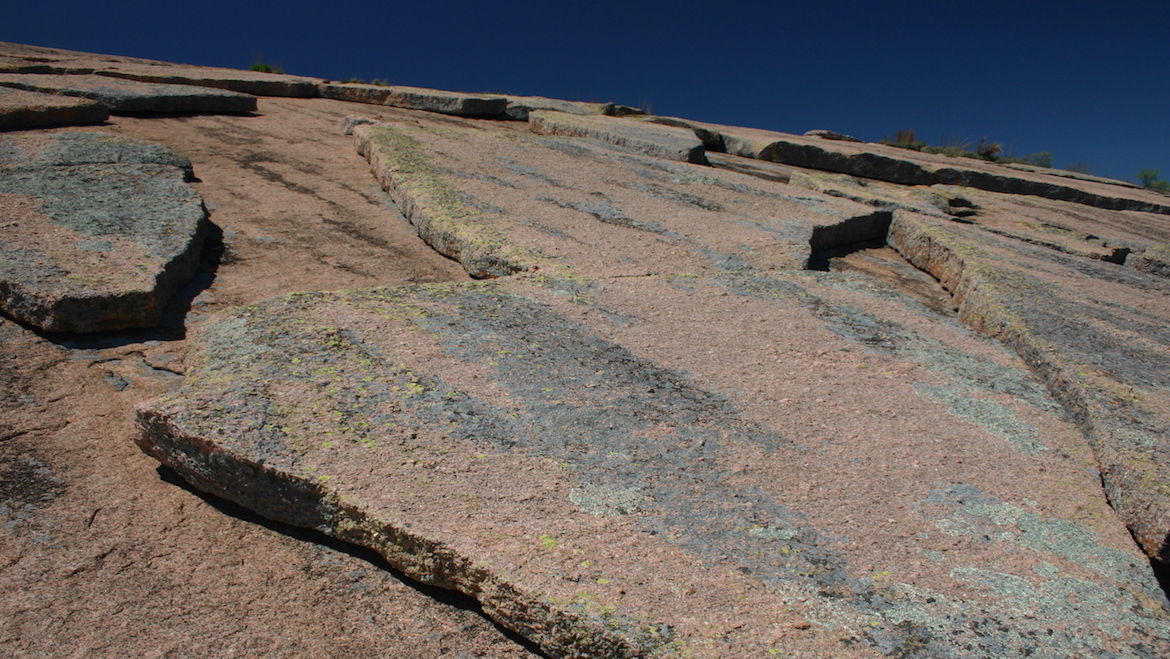Removal of very fine-sized silt and clay particles from the A and E soil horizons. Sheeting is mainly a process of mechanical weathering.

8 1 Mechanical Weathering Physical Geology First University Of Saskatchewan Edition
The process of weathering and erosion constantly changes the.

. Mechanical weathering involves mechanical processes that break up a rock. Grus An example of _____ takes place when large icicles form in the cracks inside of the turnpike tunnels in the winter which will cause damage to the structure of the tunnels if they are not removed. Its a process where the rocks erodes by peeling off in sheets.
The process by which rocks are broken down by chemical means. Removal of soluble chemical constituents from a soil is termed leaching. For example ice freezing and expanding in cracks in the rock.
Expansion and contraction of rock in areas with high daytime and low nighttime temperatures. Carbon dioxide from the air is dissolved in rainwater making it slightly acidic. Once the rock is broken down the process of erosion transports the rock bits away.
The ice then works as a wedge which slowly widens the cracks and splits the rock. WEATHERING SOILS Frost wedging is the major weathering process contributing to the formation of which. Which one of the following is an important mechanical weathering process for enlarging fractures and extending them deeper into large boulders and bedrock.
Mechanical weathering is weathering caused by the breaking down of rocks by physical force without any change in the chemical nature of the rocks. The process by which rocks are broken down by physical forces. Mechanical weather occurs on flat surfaces.
Which of the following best describes the process of eluviation. The process by which rocks are broken down during extreme weather b. The mechanical and chemical means of breaking down rocks c.
Cracking of rocks in forest fires and so forth. Chemical weathering describes the process of chemicals in rainwater making changes to the minerals in a rock. Which phrase best describes weathering.
Water Either in liquid or solid form is one of the agents of mechanical weathering. Weathering is a term that is used to describe the process by which rocks are broken down on the earths surface. Weathering may also constitute of dissolving of rocks on the surface of the earth.
The process by which the rocks are broken down by anthropogenic activities. Cracking of rocks in forest fires and so forth. Chemical weathering happens in a much shorter time frame than mechanical weathering.
Which of the following best describes weathering a. Which of the following best describes weathering. Mechanical weathering of the feldspars and micas in granite and rhyolite.
Oxidation of iron is an important chemical weathering process for ferromagnesian silicate minerals like olivine and biotite. Like most other liquids water decreases in volume when it freezes. Which one of the following is an important mechanical weathering process for enlarging fractures and extending them deeper into large boulders and bedrock.
Mechanical weathering involves mechanical processes that break up a rock. AnswerMechanical weathering is actually breaking down of rocks into smaller pieces by natural forces. Tree roots growing in similar cracks.
Mechanical weathering is usually caused by extreme hot and cold temperatures. A reaction can occur when the rainwater comes into contact with minerals in the rock causing weathering. Mechanical weathering is the physical breakdown of rock into smaller pieces.
C breakdown of rocks through mechanical or chemical processes. A building up earths surface through deposition. B when rock layers form horizontally.
Which one of the following statements best describes erosion. View 5 - GEOL100 - Chapter 6 Quizpdf from GEOL 100 at Spokane Falls Community College. Water seeps into cracks in rocks freezes and expands causing further breakdown of rocks.
Rocks are broken into smaller pieces by abrasion or pressure. Expansion and contraction of rock in areas with high daytime and low nighttime temperatures. Landforms are worn down by the agents of mechanical weathering.
D processes that make it. Chemical weathering changes the chemical composition of the materials mechanical weathering does not. In liquid form it seeped into cracks and crevices of rocks and when the temperature dropped it freezes and definitely will expand in the form of ice.
Precipitation of iron oxides during the chemical weathering process mechanical weathering of the feldspars and micas in. Tree roots growing in similar cracks. Precipitation of iron oxides during the chemical weathering process.
The mechanical weathering of rocks that leaves behind an accumulation of angular coarse-grained fragments is known as. Chemical weathering is the breakdown of rock by chemical processes. Which of the following best describes chemical weathering.
Which term best describes those processes that move weathered rock materials and soils downslope. Chemical weathering occurs in mountains. 2019-12-01 Alex Smith Geography.
The process by which rocks solidifies due to extreme heat and pressure d. Any weathering processes that can cause the physical breakdown of rocks without any type of change in the chemical composition of rocks called mechanical weathering. For example ice freezing and expanding in cracks in the rock.
My question is.

Weathering Describes The Breaking Down Or Dissolving Of Rocks And Minerals On The Surface Of The Earth Water Weather Physical Weathering Mechanical Weathering


0 Comments